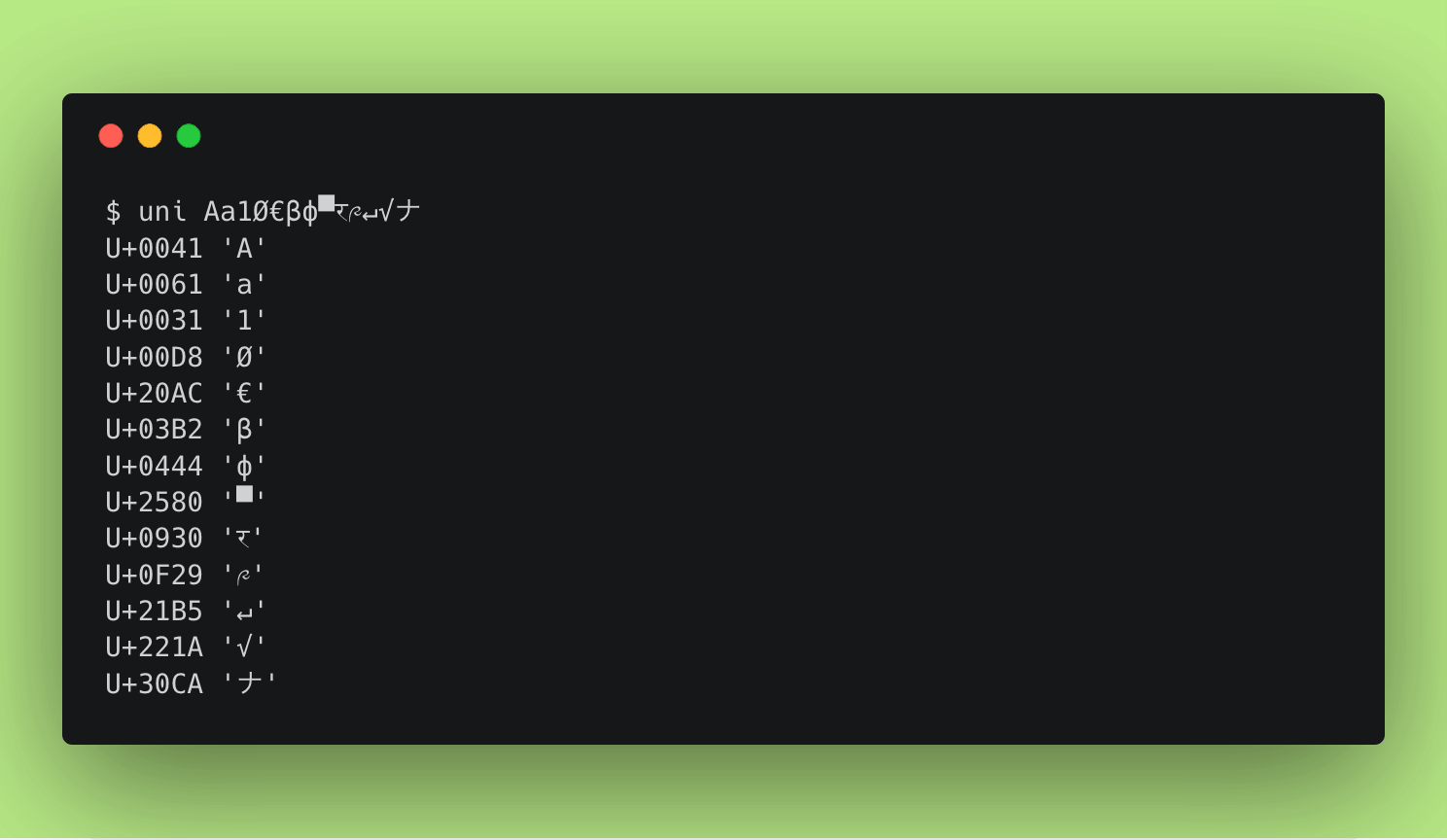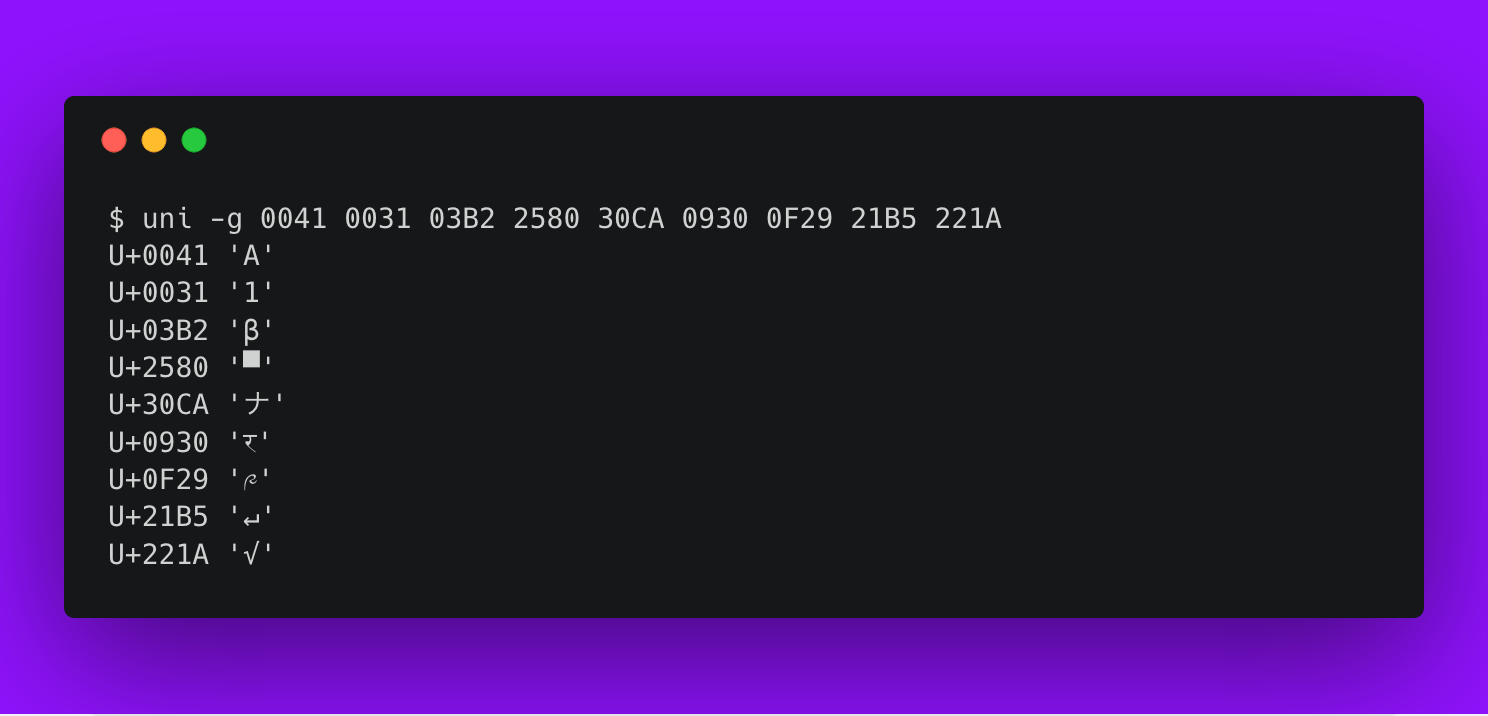uni is a command line application that performs glyph based searches for Unicode v10.0.0 defined code points and Unicode code point based searches for glyph shapes.
uni is developed in Go and compiled to the command line executable uni (uni.exe on Windows). A variety of cross-compiled binaries are available for use on Linux, macOS, and Windows systems, or you can download the source and compile the application yourself. Instructions for both approaches follow.
Download the latest compiled release file for your operating system and architecture from the Releases page.
Unpack the tar.gz archive and move the uni executable file to a directory on your system PATH (e.g. /usr/local/bin). This can be performed by executing the following command in the root of the unpacked archive:
$ mv uni /usr/local/bin/uni
There are no dependencies contained in the archive. You can delete all downloaded archive files after the above step.
Unpack the zip archive and move the uni.exe executable file to a directory on your system PATH. See details here for more information about how to do this.
There are no dependencies contained in the archive. You can delete all downloaded archive files after the above step.
You must install the Go programming language (which includes the go tool) in order to compile the project from source. Install Go v1.10 or above for Unicode v10.0.0 support. Follow the instructions on the Go download page for your platform.
Once you have installed Go and configured your settings so that Go executables are installed on your system PATH, use the following command to (1) pull the master branch of the uni repository; (2) compile the uni executable from source for your platform/architecture configuration; (3) install the executable on your system:
$ go get github.com/source-foundry/uni
The installation includes a single executable binary file. If you installed with go get or added one of the pre-compiled binaries on your system $PATH on *.nix systems, you can uninstall with:
$ rm $(which uni)
By default, uni performs a search for Unicode code points with glyph arguments. You can reverse this search behavior to identify glyphs with Unicode code point search strings by including the -g / --glyph option in your command.
-g, --glyph Search for glyph(s) with Unicode code point(s)
-h, --help Application help
--usage Application usage
-v, --version Application version
uni takes glyph arguments and displays the associated Unicode code points. You can include the glyphs in a single string or separate them with spaces. Use quotes around special shell characters.
$ uni [glyph 1]...[glyph n]
$ uni Aa1Ø€βф▀र༩↵√ナ
U+0041 'A'
U+0061 'a'
U+0031 '1'
U+00D8 'Ø'
U+20AC '€'
U+03B2 'β'
U+0444 'ф'
U+2580 '▀'
U+0930 'र'
U+0F29 '༩'
U+21B5 '↵'
U+221A '√'
U+30CA 'ナ'
You can also pipe text data to uni through the standard input stream. uni will process every glyph that it receives in the stdin stream and print the associated Unicode code point to standard output.
$ [application command] | uni
$ echo -n "Aa1Ø€βф▀र༩↵√ナ" | uni
U+0041 'A'
U+0061 'a'
U+0031 '1'
U+00D8 'Ø'
U+20AC '€'
U+03B2 'β'
U+0444 'ф'
U+2580 '▀'
U+0930 'र'
U+0F29 '༩'
U+21B5 '↵'
U+221A '√'
U+30CA 'ナ'
Unicode code point searches are performed with the hexadecimal value. Remove all prefix data from the string before you pass the request to uni. Include spaces between the Unicode code point arguments.
Acceptable hexadecimal format: 0041
Unacceptable hexadecimal formats: U+0041 u+0041 \u0041
$ uni [Unicode code point 1]...[Unicode code point n]
$ uni -g 0041 0031 03B2 2580 30CA
U+0041 'A'
U+0031 '1'
U+03B2 'β'
U+2580 '▀'
U+30CA 'ナ'
$ [application command] | uni -g
$ echo -n "0041 0031 03B2 2580 30CA" | uni
U+0041 'A'
U+0031 '1'
U+03B2 'β'
U+2580 '▀'
U+30CA 'ナ'
Please file an issue report on the repository for any problems that arise with use.
Contributions to the project are encouraged and welcomed. Please base your work on the dev branch and submit pull requests with source changes.
uni is licensed under the MIT License.

